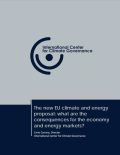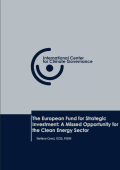
In 2016, the European Council approved the new climate and energy targets that would lead the EU action through to 2030. While these policies mark progress towards the EU’s long-term decarbonization objective, there are some contradictions to consider. Most notably, although the 20-20-20 package was in place, in the last few years the energy mix of some EU countries showed an increased reliance on fossil fuels. In addition, total emissions in Europe declined, but mainly because the economic crisis reduced energy demand in many EU Member States. The new European framework therefore comes at a critical time particularly because the 2030 policy commitments should be able to cope with this contradictions and actually promote investment into low-carbon sources. The article will explore these issues by discussing what would be the consequences of these targets into the energy market.

The European Commission and European Investment Bank have launched the European Fund for Strategic Investment (EFSI) to help recover the European Union economy. EFSI aims to bridge the investment gap and drive private capitals towards key productive sectors, such as energy efficiency and renewables. These fields are supposed to benefit the most from the Fund, given their investment needs and capacity to spur sustainable economic growth. However, limited public contributions, reshuffled capitals, and scarce capacity to improve the policy and regulatory framework characterize EFSI structure. Therefore, experts have cast doubt on the effectiveness of the Fund and its impact on the clean energy sector.

The 2015 EU Energy Union Package proposes integrating renewables into the market, just as the UK has moved away from Premium Feed-in Tariffs (FiTs) for renewable electricity supply (RES-E) to something closer to the standard FiT, which, when auctioned, demonstrated a 3% real fall in the weighted average cost of capital (WACC). The UK, which has experimented with nearly all forms of RES-E support, offers the evidence base for designing the Energy Union’s RES-E support. Innovation needs a further redesign to deliver adequate funding, best done through country contributions to an EU-wide innovation competition.
This report presents the conclusions of the independent expert group on the 'Follow-up to Rio+20, notably the sustainable development goals (SDGs)' that was established by the European Commission (EC) to provide advice on the role of science, technology and innovation (STI) for implementing the new global sustainable development agenda (2030 Agenda). The group gives recommendations, both in terms of general policy orientations and concrete areas of engagement, for EU STI policy to contribute to the implementation of the 2030 Agenda in Europe and beyond, as well as for possible engagement in international initiatives concerning STI. It recommends the EU to capitalise on its Horizon 2020 research and innovation programme, which is seeking to invest more than 60% of its budget for sustainable development and is fully open to international participation.
The European Emissions trading Scheme (EU ETS) was launched in 2005. The scheme started off with a limited scope, but has gradually expanded, in terms of geographical, sectoral and gas coverage. This report analyses the possibilities for further sectoral expansion in the Nordic countries. The analysis is done in terms of barriers and solutions for inclusion of four major sectors currently outside the scope of the scheme: transport, heating, agriculture and fisheries, and waste. Focus is on the road transport sector, which is a major source of greenhouse gas emissions in the Nordic countries. The main barriers identified for inclusion of road transport are related to the overlap with existing policy instruments, high administrative costs of downstream inclusion, and potential loss of fiscal revenue. Experiences from other trading schemes show that the barriers can be overcome.
